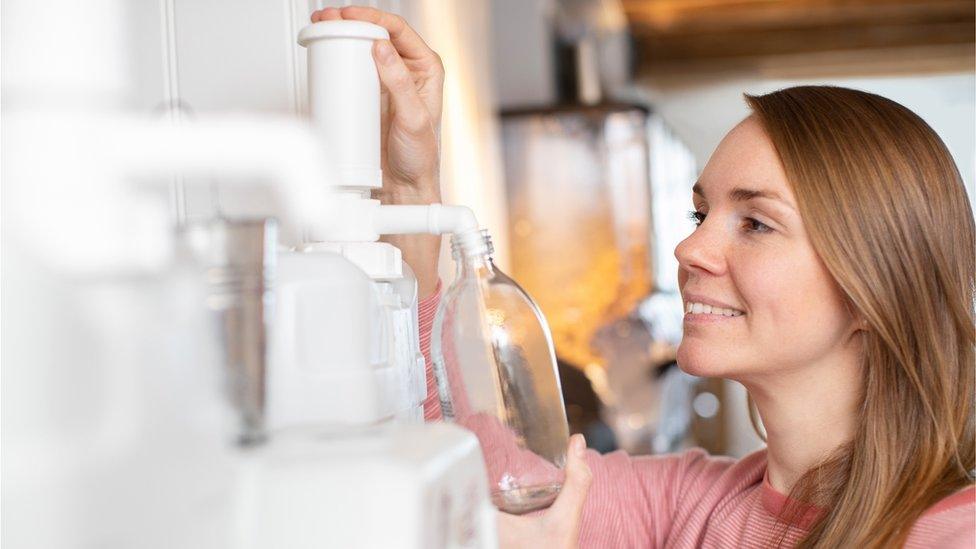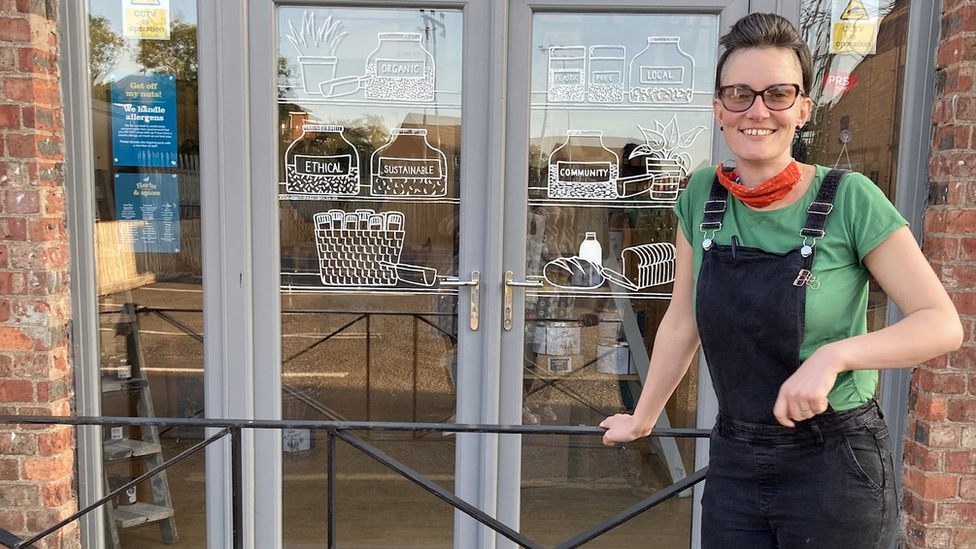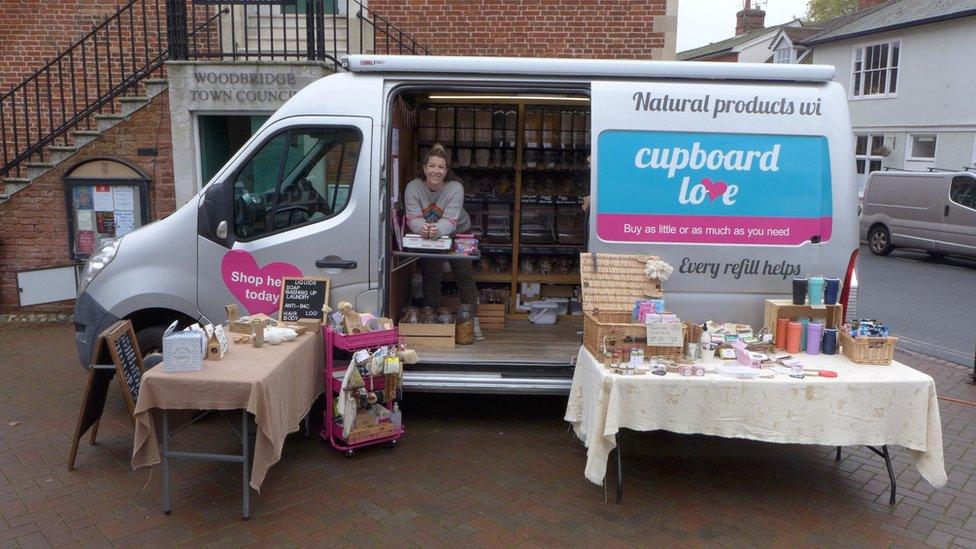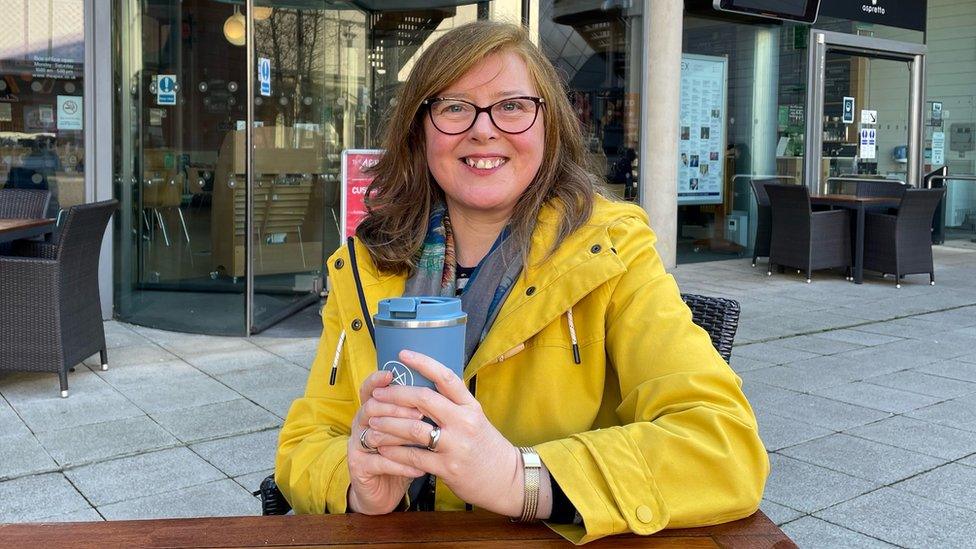Waste reduction: 'Refill just one bottle and cut plastic use'
- Published

At refill stores, people can either fill their own bottles with the products or a member of staff will do it for them
With the start of the new year, people are being urged to make a new habit to help the planet - to refill "just one bottle". But what does that mean and how can you do it?
The UK-wide #justonebottle campaign is encouraging people to do their bit for the environment by refilling just one bottle they already have at refill shops, rather than buying a new one - reducing the use of plastic in the process.
This could be refilling a bottle of washing-up liquid , shampoo, conditioner or handwash, for example.
How does it work and why get on board?
'It's about empowering individuals'

Kerry Leese says her customers have saved more than 21,550 pieces of plastic from being created by refilling their own containers
"Just refill one bottle," says Kerry Leese, who owns a zero waste shop in Northamptonshire.
"If each household did this, imagine the impact it would make. Whether it is refilling an empty bottle of washing up liquid or shampoo, we are encouraging people to just give it a go."
Food for Thought estimates that since it opened in Wellingborough in December 2020, its customers have saved more than 21,550 pieces of plastic from being created by refilling their own containers.
The network of refill shops across the UK work together, and there are said to be more than 400 such businesses across the country.
"Many members of the public feel powerless against the effects of climate change and pollution, with rates of climate anxiety rising fast," says Ms Leese.
"This campaign is about tangible change and empowering individuals and communities to do what they can. We want to show that together, with one small change, we can all contribute to the fight against climate change."

'It's about taking that first step'

Mel Menhams goes to markets in east Suffolk with her mobile zero waste shop
"You bring your own containers or packaging," explains Mel Menhams, who runs her mobile shop from the back of her van.
"I serve people from my van but some other refill shops in the area are more self-serve so there's something rather exciting about pulling the dispensers down and filling your own bag or jar - it's very satisfying."
Mrs Menhams set up her business three-and-a-half years ago after recognising the need.
The mum-of-two, who previously worked as a primary school teacher, goes to the markets in Woodbridge, Framlingham and Wickham Market, plus other sites.
Her van is rammed full of everything from shampoo, bathroom cleaner and washing up liquid to dry goods, including pasta, rice, nuts, herbs, spices and dried fruit.
She says she has seen the number of customers increase over the years, and people are still surprised by what they can buy.
"You don't have to put anything in your bin or recycling at the end, it can work out cheaper, it reduces food waste if you only buy what you need for a particular recipe and it's a really nice way to shop."
Mrs Menhams says the #justonebottle campaign could have lasting effects.
"I live in Woodbridge and there are 7,000 homes there. If every household refilled just one bottle, that could save 7,000 bottles of plastic waste," she says.
"It might start with one bottle but then next time you might come and fill up your pasta, it can snowball.
"It's about taking that first step - start small and add more to your refill basket."

'Refilling is just so easy'

Charlie Zakss says it is about building that new habit
Among those who have already got into the habit of refilling is Charlie Zakss - and now she is encouraging others to make the "easy swap".
The mother-of-one from Woodbridge says she has "been doing it for years".
"We do everything we possibly can and the places where you can go make it easy now," she says.
Products she gets include washing-up liquid, bathroom cleaner, toilet cleaner, shampoo, conditioner and bodywash.
"It's just so easy and if you want to be a bit more eco it's one of the easiest things to do," says the 46-year-old, a learning officer for the Suffolk Wildlife Trust.
"Do it at a time that suits you and once you get into the habit, it makes it very easy.
"I know some eco swaps are a bit more expensive but if you do it one by one then you can do it manageably with what you can."
She says you don't have to be particularly organised to do it either.
"I have conditioner in shampoo bottles and the other way around - I'm definitely not organised," she says.
"It's just habit; you do one thing, and then another, and then you've eliminated the need of going down a whole supermarket aisle."

'One small change can lead to bigger changes'

Karen Cannard, who founded the Rubbish Diet, says "every positive behavioural change makes a difference"
Zero waste researcher Karen Cannard, who founded the Rubbish Diet, billed as "the UK's original slimming club for bins" says it is great to see how many zero waste shops have popped up since she first started her blog in 2008.
"When I think back to then, those are the kind of products I would have to buy online or drive 10 miles to a farm shop for," says the mother-of-two from Bury St Edmunds.
She says there has been a surge of interest in reducing waste and "every positive behavioural change makes a difference".
"If you are a household that is not used to refilling but you think 'I'm going to make one small change and try refilling one product', that's a really positive step in the right direction.
"And that one small change can lead to bigger changes," she says.
The 53-year-old says members of her household get various things refilled, from laundry products to coffee beans; pasta to hand soap.
"Habits take a while to build but we are now into the year 2022, and whether you are a person who makes new year resolutions or not, it is worth trying to refill just this one bottle and seeing where it leads," she says.

Find BBC News: East of England on Facebook, external, Instagram, external and Twitter, external. If you have a story suggestion email eastofenglandnews@bbc.co.uk, external